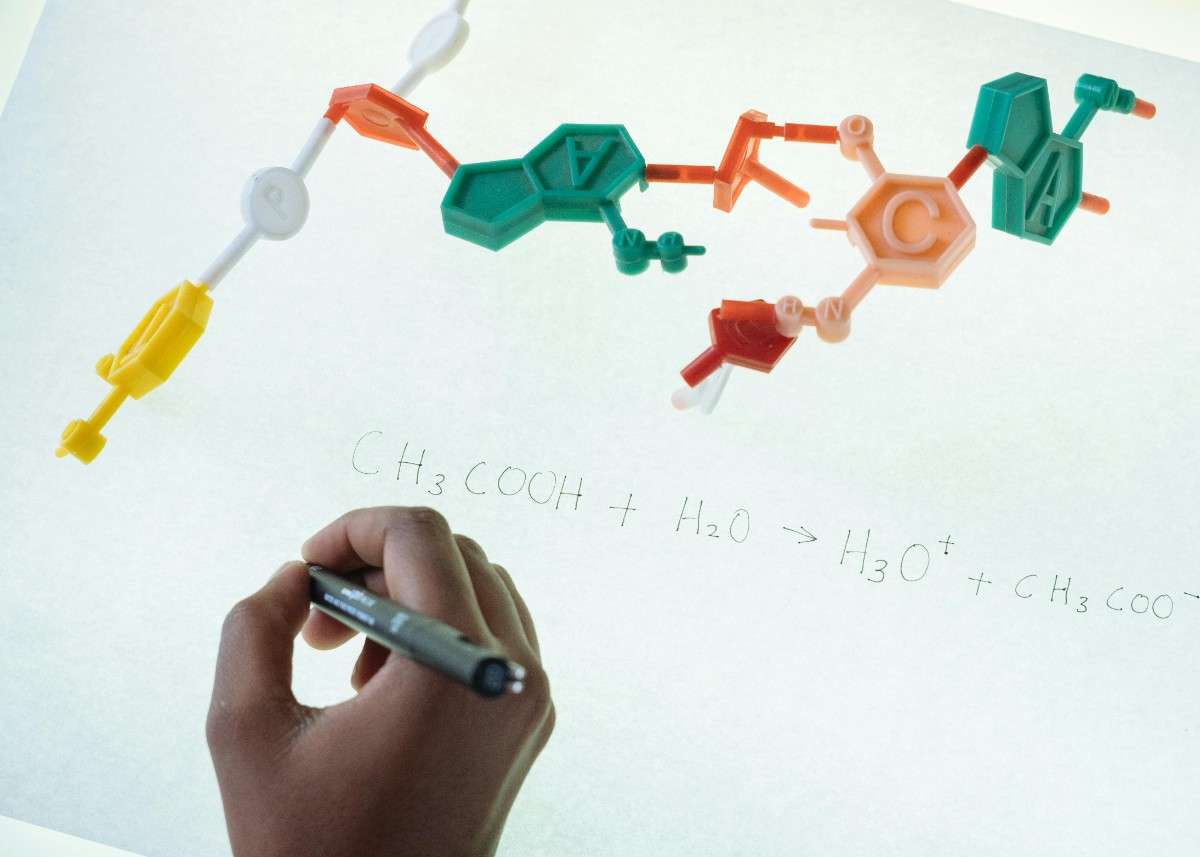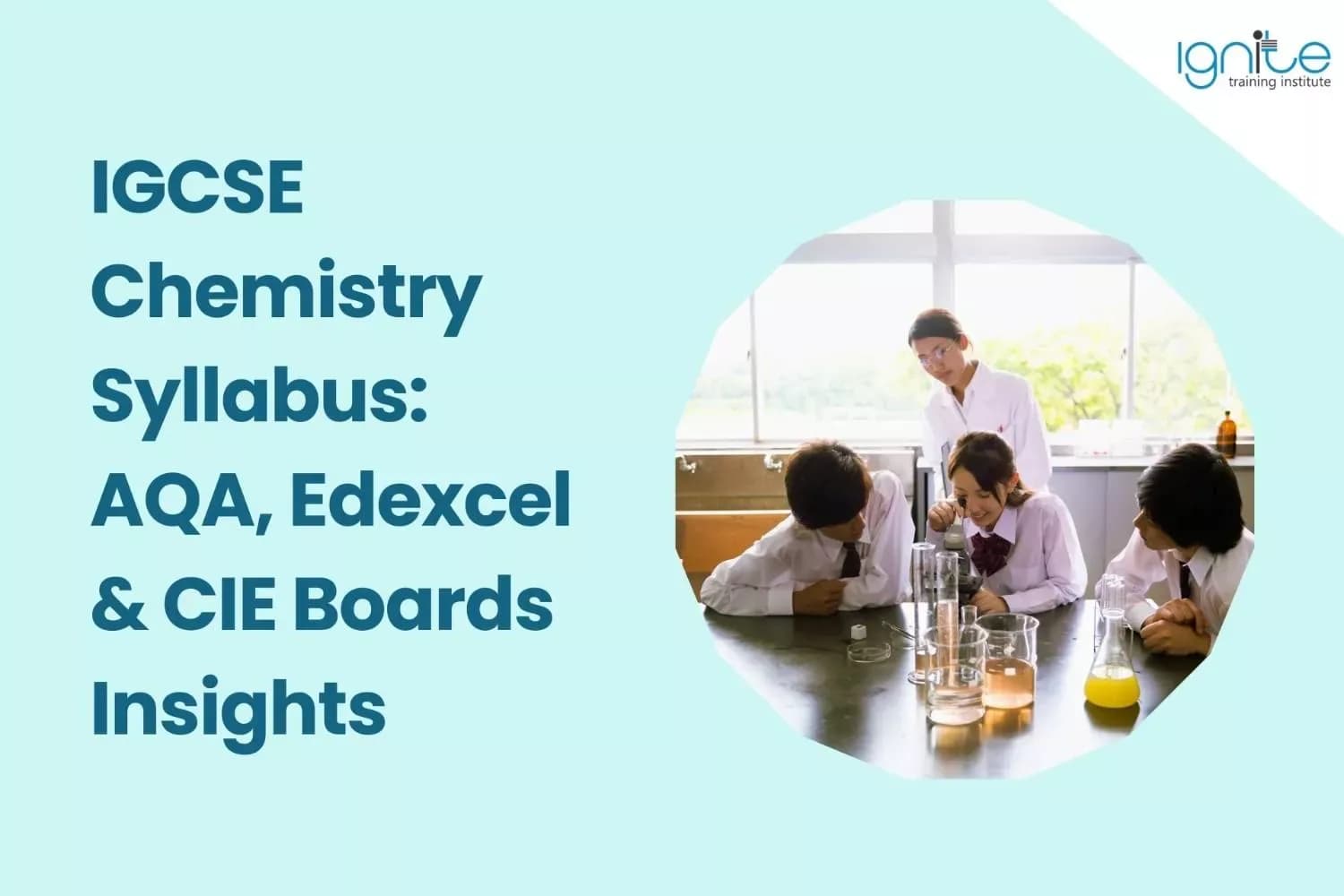The IGCSE Chemistry syllabus covers a fascinating yet challenging range of topics, from the structure of atoms to the complexities of organic chemistry. For many students, the breadth and depth of the material can feel overwhelming, especially when preparing for final exams. This guide aims to simplify that journey by breaking down the syllabus into clear, digestible sections.
We’ll explore what IGCSE Chemistry entails, examine the exam boards that offer it, and provide concise overviews of the AQA, CIE, and Edexcel syllabuses. You’ll also discover proven strategies to achieve top grades, alongside expert tips from seasoned tutors.
For students in Dubai, Ignite Training Institute offers personalized IGCSE Chemistry tutoring aligned with each exam board’s syllabus, ensuring targeted preparation and academic success.
What Is IGCSE Chemistry?
IGCSE Chemistry is an internationally recognized secondary education course offered by exam boards like CIE, AQA, & Edexcel. It covers essential principles in chemistry, including atomic structure, chemical bonding, reactions, acids and bases, and organic chemistry.
The curriculum focuses on theoretical understanding and practical applications, aiming to prepare students for further studies in chemistry while highlighting its relevance in daily life.
Related: Edexcel IGCSE Biology Syllabus – A Student’s Critical Guide
Which Exam Boards Offer the IGCSE Chemistry Syllabus?
IGCSE Chemistry syllabus is offered by several prominent exam boards, each bringing a unique structure and approach to learning. Cambridge Assessment International Education (CAIE/CIE) is widely recognised for its 0620 syllabus and the Ofqual-regulated 0971 version, both balancing theoretical knowledge with practical skills.
Pearson Edexcel International provides the subject as a standalone qualification as well as part of its Combined Science programme, giving students flexibility in how they study. OxfordAQA takes a modern approach with its International GCSE Chemistry course, designed to reflect current scientific developments and global education standards.
Although all exam boards cover essential topics such as atomic structure, chemical bonding, energetics, and organic chemistry, differences emerge in the level of depth, practical components, and examination formats. Ultimately, the choice of exam board often depends on a school’s curriculum, teaching approach, and preferred style of assessment.
Related: AQA VS CIE: A Closer Look Into The Examination Boards
AQA IGCSE Chemistry Syllabus & Assessment: Brief Overview
AQA IGCSE Chemistry offers students a comprehensive understanding of key chemical principles and applications within the International General Certificate of Secondary Education (IGCSE) framework.
1. Curriculum Coverage:
- Atomic Structure: Students learn about the composition of atoms, including protons, neutrons, and electrons, and how they contribute to the properties of elements.
- Chemical Bonding: The course explores the various types of chemical bonds, such as ionic, covalent, and metallic, and how they form molecules and compounds.
- Chemical Reactions: Students study the different types of chemical reactions, including synthesis, decomposition, acid-base, and redox reactions, and how to balance chemical equations.
- Acids And Bases: The curriculum delves into the properties of acids and bases, including pH, indicators, and their role in various chemical reactions.
- Organic Chemistry: Students learn about the structure, properties, and reactions of organic compounds, including hydrocarbons, alcohols, and carboxylic acids.
- Laboratory Work: Practical experiments and laboratory work are integral components of the course, allowing students to apply theoretical knowledge and develop essential experimental skills.
2. Assessment:
Paper 1:
- Duration: 1 hour 30 minutes
- Marks: 90
- Weightage: 50% of GCSE
- Assessable Parts: Any part of the specification may be assessed
Paper 2:
- Duration: 1 hour 30 minutes
- Marks: 90
- Weightage: 50% of GCSE
- Assessable Parts: Any part of the specification may be assessed
Course Structure:
- Designed for a two-year duration
- Linear qualification
- All assessments must be completed at the end of the course and in the same series to achieve the award
3. Objective:
- AQA IGCSE Chemistry aims to equip students with a solid foundation in chemistry, preparing them for further study in science-related fields or careers in industries such as healthcare, engineering, and research.
Related: IGCSE Computer Science: Syllabus Overview & Paper Details
CIE IGCSE Chemistry Syllabus & Assessment: Brief Overview
Cambridge IGCSE Chemistry offers students a thorough understanding of essential chemical concepts, practical skills, and scientific methods. The syllabus is designed to nurture curiosity, analytical thinking, and problem-solving abilities while building a strong foundation for advanced scientific study.
1. Curriculum Coverage:
- States of Matter – Properties and changes of solids, liquids, and gases.
- Atoms, Elements, and Compounds – Atomic structure, isotopes, and chemical symbols.
- Stoichiometry – Formulae, equations, and mole concepts.
- Electrochemistry – Electrolysis and uses of electrochemical cells.
- Chemical Energetics – Energy changes in reactions, including exothermic and endothermic processes.
- Chemical Reactions – Types of reactions, rates, and reversible changes.
- Acids, Bases, and Salts – Properties, reactions, and preparation methods.
- The Periodic Table – Group trends and periodicity in properties.
- Metals – Extraction, uses, and properties of metals and alloys.
- Chemistry of the Environment – Air, water, and pollution control.
- Organic Chemistry – Structures, properties, and reactions of key organic compounds.
- Experimental Techniques & Chemical Analysis – Practical methods and investigative skills.
2. Assessment:
This examination consists of six papers assessing various aspects of the subject, including multiple-choice, theory, and practical components, each contributing to the overall evaluation.
Paper 1:
- Duration: 45 minutes
- Type: Multiple Choice
- Weightage: 30%
- Marks: 40
- Format: 40 four-choice multiple-choice questions
- Content: Based on Core subject content
- Assessment: Externally assessed
Paper 2:
- Duration: 45 minutes
- Type: Multiple Choice
- Weightage: 30%
- Marks: 40
- Format: 40 four-choice multiple-choice questions
- Content: Based on Extended subject content (Core and Supplement)
- Assessment: Externally assessed
Paper 3:
- Duration: 1 hour 15 minutes
- Type: Theory
- Weightage: 50%
- Marks: 80
- Format: Short-answer and structured questions
- Content: Based on Core subject content
- Assessment: Externally assessed
Paper 4:
- Duration: 1 hour 15 minutes
- Type: Theory
- Weightage: 50%
- Marks: 80
- Format: Short-answer and structured questions
- Content: Based on Extended subject content (Core and Supplement)
- Assessment: Externally assessed
All Candidates Take Either Of The Following Assessments:
Paper 5:
- Duration: 1 hour 15 minutes
- Type: Practical Test
- Weightage: 20%
- Marks: 40
- Content: Based on experimental skills
- Assessment: Externally assessed
OR:
Paper 6:
- Duration: 1 hour
- Type: Alternative to Practical
- Weightage: 20%
- Marks: 40
- Content: Based on experimental skills
- Assessment: Externally assessed
3. Objective:
The syllabus develops a strong grasp of chemical principles and experimental skills, enabling students to apply knowledge in real-world contexts. It also prepares learners for further studies in chemistry, biology, physics, environmental science, and careers in healthcare, engineering, and research-based industries.
Related: IGCSE Physics: AQA, CIE, & Edexcel Exam Boards Overview
Edexcel IGCSE Chemistry Syllabus & Assessment: Brief Overview
Embark on a journey through the fascinating world of chemistry with Edexcel IGCSE Chemistry, where students delve into essential concepts and applications within the International General Certificate of Secondary Education (IGCSE) framework.
1. Curriculum Coverage:
- Atomic Structure: Explore the intricate composition of atoms, including protons, neutrons, and electrons, and their profound impact on the properties of elements.
- Chemical Bonding: Unravel the mysteries of chemical bonding, encompassing ionic, covalent, and metallic bonds, and their role in shaping the structure and behavior of compounds.
- Chemical Reactions: Navigate the diverse landscape of chemical transformations, from synthesis to redox reactions, and master the art of balancing chemical equations.
- Acids And Bases: Investigate the properties of acids and bases, unravel the intricacies of pH and indicators, and discover their significance in a myriad of chemical reactions.
- Organic Chemistry: Delve into the realm of carbon compounds, exploring the structure, nomenclature, and reactions of hydrocarbons, alcohols, and carboxylic acids.
- Practical Work: Engage in hands-on experimentation and laboratory exercises, bridging theory with practice and honing essential laboratory skills.
2. Assessment:
This examination comprises two papers, each employing various question styles and covering distinct aspects of the subject, contributing to the overall assessment.
Paper 1:
Assessment Information:
- Duration: 2 hours
- Assessed and marked by Pearson
- Weightage: 61.1% of the qualification
- Question Styles: Multiple-choice, short-answer, calculations, extended open-response
- Content Assessed: Non-bold and non-‘C’ referenced content
- Coverage: Questions from any topic area across the specification
- Marks: 110
Paper 2:
Assessment Information:
- Duration: 1 hour and 15 minutes
- Assessed and marked by Pearson
- Weightage: 38.9% of the qualification
- Question Styles: Multiple-choice, short-answer, calculations, extended open-response
- Content Assessed: All content, including bold and ‘C’ referenced content
- Coverage: Questions from any topic area across the specification, with bold statements covering some sub-topics in greater depth
- Marks: 70
Objective:
Edexcel IGCSE Chemistry aims to equip students with a solid foundation in chemistry, preparing them for further studies in science-related fields and nurturing future leaders in industries such as healthcare, engineering, and research.
Related: How To Study For IGCSE Biology? 10 Must-Know Tips
How To Pass The IGCSE Chemistry Exam With An A?

Achieving top grades in IGCSE Chemistry requires more than just memorizing facts; it demands strong conceptual understanding, consistent practice, and smart exam techniques. Whether studying the Cambridge IGCSE Chemistry (0620) 2026–2028 syllabus or another exam board, following proven strategies can significantly increase the chances of securing an A or A*:
1. Understand The Syllabus Thoroughly
Review the syllabus document to know exactly which topics can be tested. Pay attention to both Core and Supplement content if sitting the Extended paper.
2. Master The Core Concepts First
Focus on fundamental topics such as atomic structure, bonding, chemical reactions, and the periodic table before tackling more advanced sections.
3. Use Past Papers Effectively
Practice with at least 5–10 years of past papers. This helps identify recurring question styles and strengthens exam technique.
4. Learn From Mark Schemes
Mark schemes show exactly what examiners expect for each question. This improves answer precision and prevents losing marks for incomplete explanations.
5. Practice Time Management
Simulate real exam conditions by answering papers within the given time limits. Allocate time for multiple-choice, structured, and long-answer questions proportionally.
6. Strengthen Practical Skills
If taking Paper 5 or Paper 6, focus on experimental techniques, observation skills, and data interpretation. Review common lab apparatus and their uses.
7. Use Visual Learning Tools
Diagrams, mind maps, and flowcharts help simplify complex topics like organic chemistry, electrolysis, and gas tests.
8. Revise Using Topic Checklists
Break revision into smaller topic-based goals. Tick off each section once mastered to track progress.
9. Work On Weak Areas Early
Identify problem topics, such as mole calculations or chemical energetics, and tackle them well before the exam.
10. Stay Consistent With Study
A well-planned timetable with daily study sessions ensures steady progress. Avoid last-minute cramming by revising consistently over months.
By combining these strategies with regular self-assessment and disciplined study habits, achieving an A or A* In IGCSE Chemistry becomes an attainable goal.
Related: Best IGCSE Tutors In Dubai To Achieve Grade Excellence
Ignite Training Institute – IGCSE Chemistry Tutors In Dubai
Ignite Training Institute offers premier IGCSE Chemistry tutoring in Dubai, providing comprehensive and personalized support for academic excellence. With experienced tutors, tailored instruction, and a focus on empowering students, Ignite fosters a supportive learning environment to help students excel in the subject.
Related: 10 Easiest IGCSE Subjects In 2024 For Academic Excellence
FAQs
1. Is IGCSE Chemistry Easy?
IGCSE Chemistry difficulty varies depending on individual strengths and study habits, but it generally requires thorough understanding and practice.
2. Is Physics Harder Than Chemistry IGCSE?
The difficulty of Physics versus Chemistry in IGCSE can vary depending on individual strengths and preferences.
3. How Can I Get Full Marks In IGCSE Chemistry?
To achieve full marks in IGCSE Chemistry, thorough understanding, consistent practice, and effective exam technique are essential.
4. Should I Take Core Or Extended Chemistry?
Core is suited for students aiming for grades C to G and covers the fundamental topics. Extended includes both Core and Supplement content, allowing access to the full grade range from A* to G.
5. Is This Syllabus Valid For 2027 And 2028 Too?
Yes, the Cambridge IGCSE Chemistry (0620) 2026–2028 syllabus is valid for examinations in 2026, 2027, and 2028. The next review is expected after this period.
6. How Do You Get An A* In Chemistry IGCSE?
Achieving an A* requires a deep understanding of the syllabus, consistent past paper practice, and mastery of both theory and practical skills. Focusing on exam techniques and common question patterns can boost scores.
7. What Is The Difference 0971 And 0620 Chemistry In IGCSE?
Both syllabuses have identical content, but 0971 includes an endorsement for exams taken in the Middle East region. The assessment structure and grading are the same.
Conclusion

In conclusion, IGCSE Chemistry offers students a captivating exploration of chemical concepts essential for understanding the natural world. Success in this subject demands dedicated study, effective exam preparation, and a passion for scientific inquiry.
By mastering the principles of chemistry, students not only gain valuable knowledge but also develop critical thinking skills crucial for future academic and career endeavors.
Related: What Is AQA GCSE: A Detailed Overview For Students & Parents

